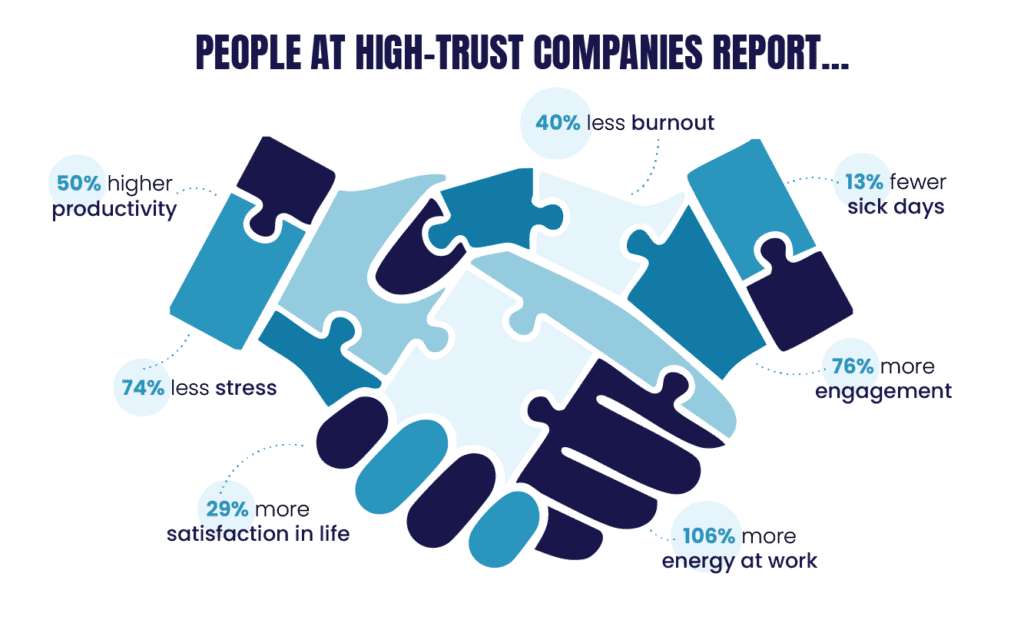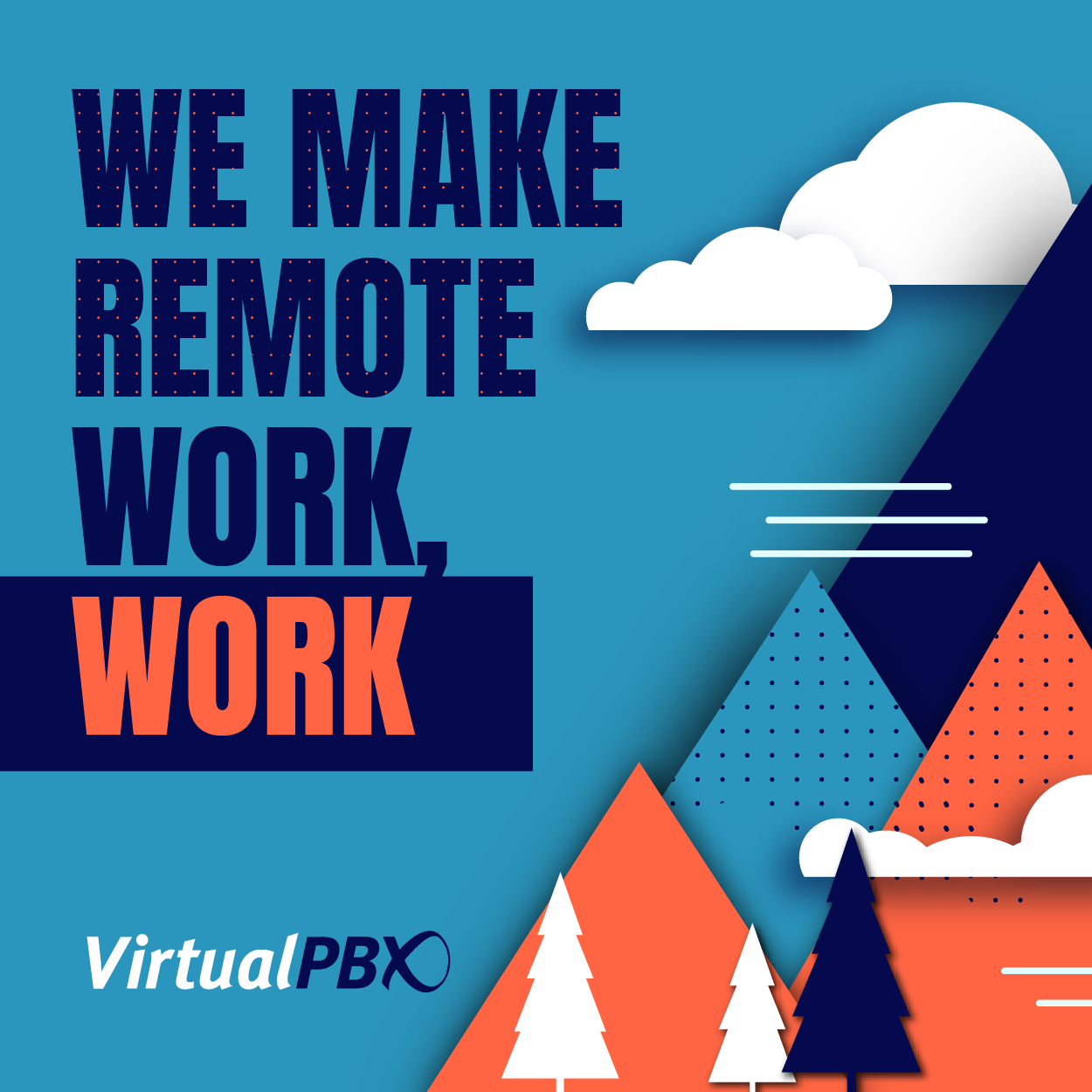In an era where it feels like employee trust and loyalty are something of the past, remote work has a demonstrated bright spot, with greater employee retention and trust that runs both ways. As it turns out, building trust in virtual teams provides key insight into building trust in all company environments.
Employee trust and loyalty are not gone. They are, in fact, evolving and rebalancing in the form of opportunity—opportunity for growth, flexibility, and work-life balance. Paramount in this effort to redistribute and evolve is trust.
A fundamental component in the workplace, trust is essential in successful, thriving teams. When employees trust their leaders and organizations, they are engaged, motivated, and committed to high-quality outcomes. Likewise, when organizations trust employees, the culture, work-life balance, attitude, and team relationships all flourish. Attracting and retaining talent becomes intrinsic.

Yet even with this proven symbiosis, studies report that the trust gap is growing and employee loyalty is on a two-decade decline. A 2024 study by PwC shows that 61% of employees agree that a perceived lack of trust by their employer impacts their ability to do their jobs well. Executives also agree (42%) and additionally cite declines in product and service quality (41%), operational efficiency (40%), and profitability (38%).
So, what comprises trust within a company? Inc.com listed a lack of open communication as a number one challenge to company trust-building, followed second by fear of conflict.
For over a decade, remote companies have had trust built into the foundation of their very business model—an often overlooked requirement of their continued existence. And as they’ve excelled in establishing and maintaining that trust, they have quietly found the enviable antidote for both of these challenges, applicable to businesses of all types.
Remote Teams Thrive On Open Communication.
Build A Culture Of Transparency
Keep your team in the know about company news, project updates, and any changes that might impact their work. Do it efficiently and without clogging feeds. Building trust in your team means ensuring they feel a sense of belonging and a part of the company. Employees who feel like they have skin in the game are more invested, passionate, and loyal.
Do Regular Check-Ins Better
Many mangers use 1:1’s and team meetings as check-ins to ensure everyone is doing their job. But virtual companies are building trust in their remote teams by using 1:1’s and team meetings for big picture topics, ideas, relationship building, and to provide a conduit for open communication and collaboration. Check in on employee progress through your tools—performance dashboards, project tracking, and analytics can quickly let you know if everyone is doing their job without wasting valuable meeting time.
Listen first, often, and actively
In-person teams see each other daily, often assuming they know what’s going on, but successful remote companies are constantly engaged in active listening. They’re paying attention to team members’ concerns, responding thoughtfully, and demonstrating that employee voices are heard and valued. Many companies utilize tool features to track employee engagement and sentiment in the background. These strategies confidently and accurately alert leaders to problems before they become full-blown.
Remote Teams Flex Their Tools
Everyone uses communication platforms like Slack, Microsoft Teams, or Zoom, but remote teams leverage all aspects of tools to facilitate easy and efficient communication. Seamless collaboration and integration across all of their platforms reinforces seamless communication across all teams. Using every feature of your tools often frees time for meaningful opportunities to build relationships and trust.
Make Face-to-Face Interactions Count
Virtual teams make face time count. Building trust in your team, means using their time wisely and demonstrating that work-life balance is important to the company also. Don’t over-schedule meetings. Remote teams prioritize video meetings to build rapport, create a sense of intentional connection, and really move the needle.
Remote Employers Set Clear And Balanced Expectations.
Remote Companies Define Team Roles and Foster Accountability
When you’re building trust in your remote team, there’s no room for assumption. Team leaders must clearly define goals and responsibilities so that everyone understands their role and expectations. But there’s a key component here that’s often missing—access. If Suzy needs a document that’s only on John’s desktop, or James wants to work in the evening but can’t access the on-site server, both will struggle to meet their goals. Remote teams know how to approach access without compromising flexibility or security to ensure every employee has exactly what they need, when they need it, wherever they are. And of course, the same control to remove access the moment it needs to be limited.
Micromanaging Can Kill Every Gain You've Made
Building trust in your team means giving them space to work independently. In an in-person environment, leaders are often tempted to check in frequently. When you transfer this effort to a remote team however, it becomes very easy to see how unhealthy that practice becomes. The excessive oversight is often a flag of an unhealthy lack of trust, even without warrant. Instead, virtual leaders focus on results and provide guidance when needed, rather than controlling every step of the process.
Virtual Teams Rely On Consistency
Much about building trust for remote teams solidifies with the consistency of approach. Through all of these strategies, consistency is key in balancing expectations with flexibility. Because it’s more difficult for remote teams to cut corners or skip processes and still keep everyone in the loop, virtual companies are often far more successful in this arena, building a routine of ongoing trust.
Recognition Reins King
Virtual teams don’t undervalue face-to-face opportunities. They know that every avenue for connection is valuable. Remote teams build trust, engagement, and buy-in by recognizing individual and team achievements. From tracking key performance indicators (KPIs) to project milestones, or even workiversaries, remote companies don’t miss an opportunity to make employees feel valued, included, and to highlight passion and effort. Recognizing contributions reinforces a culture of trust and appreciation that results in greater engagement and job satisfaction.
Virtual Businesses Protect Their Employees.
It seems like it should go without saying, but protecting company data goes well beyond company materials. Often, in-person companies focus on the security of their data and equipment over the flexibility they offer to employees. However, over 70% of employees say they want their company to protect their own employee data as well, an often overlooked component in office security. Simple tools like private, secure browsers, prioritize not only the protection of company and customer data, but also the protection of the employee—and of course, they work anywhere and anytime the team does.
When Internal Trust Is Built In, External Trust Is Natural.
Regardless of whether your teams are in-person, remote, hybrid, or comprised of a combination, studies clearly show that high-trust internal environments foster the same and greater levels of trust and protection externally. This means that the trust you model for your teams results in employees who are more committed to protecting company and customer data, responding and resolving concerns quickly, and reliably delivering an exceptional and consistent work product and customer experience.
A Federal Work-Life Survey Report showed that 72% of remote employees achieved better performance, 83% had higher morale, and 76% wanted to stay at their current company. These figures reinforce that building trust is teams is an evolving yet ever-alive concept accessible to any company willing the lay the groundwork.







